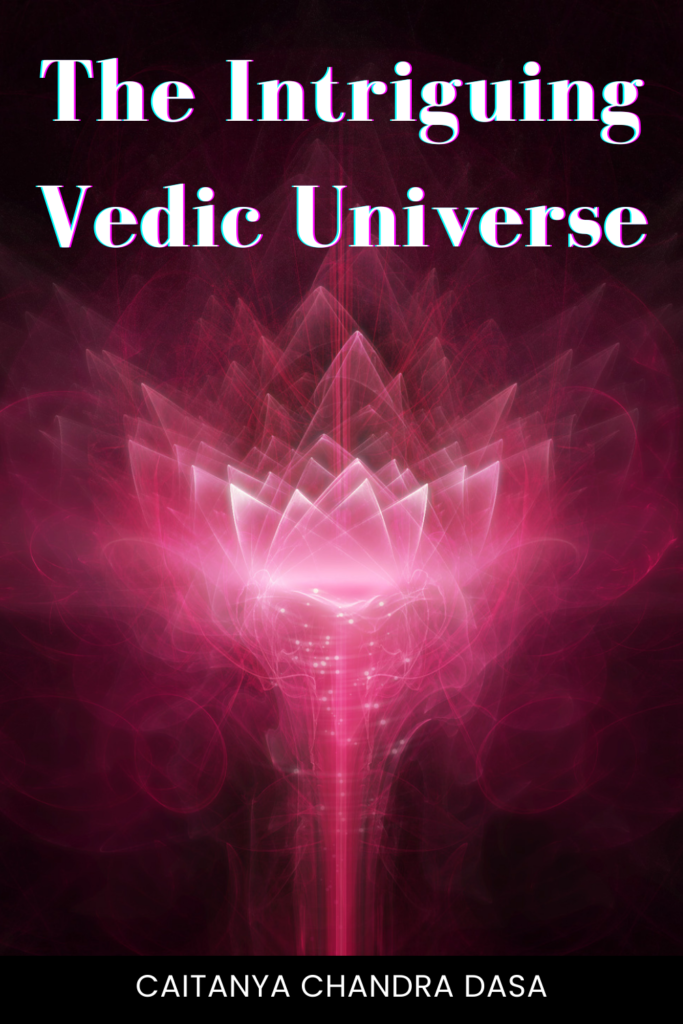Download the book: The Intriguing Vedic Universe
(right-click and choose “save as” to download instead of opening)

Preface:
The Vedas explain many topics, including the soul, metaphysics, God, and superior beings living in higher planetary systems. Most of these topics can’t be proven or disproven by modern science since they are outside the realm of experimentation. One can make experiments only with things or beings that are lower than himself. One can freely experiment with inanimate matter or even with animals, but one can’t experiment with beings that are more powerful than him. A researcher may experiment with rats and rabbits, but he can’t make experiments with the president of the United States, for example. Unless he would agree to come and be experimented upon, the researcher would be baffled. Similarly, one can’t make experiments with God: or he accepts the conditions set up by Him, or he will not get anything.
Science is based on experimentation and therefore is by design not an effective tool for getting knowledge about God, the soul, or higher beings, as well as subtler entities or higher levels of reality that are beyond our sense perception. These are topics that will always remain out of the reach of modern researchers. One may accept or not the Vedas, but the fact is that there is no other source that gives detailed knowledge about these topics. That’s an area where the Vedas have a monopoly we can say.
However, there is a part of Vedic knowledge that overlaps with modern science: cosmology. The Vedas give knowledge about the structure of the universe, as well as important historical events that can be proven or disproven by experimentation.
This is a very important point because if it’s proved that the cosmological knowledge of the Vedas is correct, this makes a very strong case that everything else in the Vedas is correct, including all the spiritual knowledge. However, if the cosmological knowledge from the Vedas can be disproved by modern science, this makes an equally strong case that everything else in the Vedas may be incorrect, and everything may be actually just a big fantasy.
The British in India did a very good job of discrediting the Puranas with their spurious translations and false propaganda, to the extent that even most Indians believe that the Puranas are just myths. As a result, other parts of the Vedas are also not taken seriously and people are deprived of the spiritual knowledge they contain. Once the Puranas are discredited, people automatically become skeptical about the knowledge from the Bhagavad-Gita and other books of spiritual knowledge.
The problem with the cosmology of the Puranas is that it offers a description of the world that is different from our sense perception. It’s not easy to understand and even harder to harmonize with recent cosmological discoveries. Many read the 5th canto of the Srimad Bhagavatam and get under serious doubts. Do I need to believe that the earth is flat and the men never went to the moon to be a devotee of Krsna?
When the first Apollo mission landed, many were skeptical that they really went to the moon. The quality of the footage was quite bad, and the dispute with the USSR and other factors raised a lot of questions for a lot of people. Many started to wonder if that first mission was not just some kind of hoax. Prabhupada himself wrote a letter raising a number of questions about the landings.
However, with the subsequent Apollo Missions, as well as probes from the USSR, Europe, China, and India the evidence started to mount. The same evidence was verified by different sources, making it very difficult to contest that men indeed were going to this piece of rock orbiting our planet that we call The Moon.
Similarly, it’s very easy to prove that the Earth we can observe with our senses is not flat. Greeks did so more than 2000 years ago using simple experiments. Especially nowadays, when so much information is just a Google search away, it’s becoming increasingly difficult to just dismiss all the scientific information in this regard as hoaxes.
In this book, I try to “stand on the shoulders of giants”, sharing what I learned about this topic over the years and trying to offer a simple and inclusive explanation of how to make sense of the cosmological knowledge of the Puranas. As a bonus we will study how modern science is actually corroborating the knowledge from the Srimad Bhagavatam, which is quite amazing, considering that the Puranas were written more than 5000 years ago.
How the sages of ancient times were able to give dates for the creation of the solar system, as well as the creation of the universe itself and extinction events whose dates were discovered only recently by modern researchers is a question that modern scientists still have to answer.
